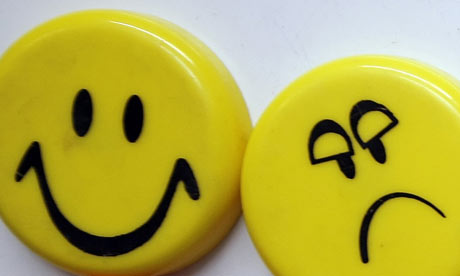
How happy are you right now? Content? Satisfied? Anxious? Crucially, who else feels the way you do?
The Office for National Statistics was asked by the Prime Minister David Cameron last November to find out - or at least to work out how to find out. National Statistician Jill Matheson has been in charge of the £2m a year wellbeing project, which reported for the first time today after a six month-long consultation. That is a crucial difference: happiness is one intangible thing; wellbeing is - they say - measurable in the same way our economy is. Says Matheson
It is essential that the set of measures of well-being is relevant and well-based in what matters to people, both as individuals and for the UK as a whole
So, how will they do it? The study has been split into a search for two types of indicators - subjective ones about how we feel and objective measures of things that affect our wellbeing.
On the subjective front, work started in April, with four extra questions to the 200,000 people in the Integrated Household Survey (IHS). People were answer the following questions, on a scale of 0 to 10:
• how satisfied are you with your life nowadays?
• how happy did you feel yesterday?
• how anxious did you feel yesterday?
• to what extent do you feel the things you do in your life are worthwhile?
The first results are expected back in July next year.
On top of those subjective questions, the ONS is planning to measure four major areas. It just hasn't decided how to measure them yet:
Childhood
Children's happiness is particularly susceptible to government policy - whether it's childcare or the effect of cuts on education. Evidence the ONS received from Unicef, the UN's children's body, says: "the true measure of a nation's standing is how well it attends to its children'. Looks most likely to examine bullying, how powerless children feel and whether they are enjoying life. One of the big questions is whether only the children are surveyed or parents and carers are too. Read more from the ONS on this.
Economy and inequality
Already measured by the much-maligned Gross Domestic Product (GDP) indicator, which gather together economic data to measure what the country produces. Britain has been falling down the GDP league table for some time, ranking around 15 in the world. GDP was first developed in 1934 by economist Simon Kuznets - who was adamant it should not be used to measure the wellbeing of a nation. It's limited by what it doesn't take account of: the value of health and educational services, inequality and poverty rankings or the state of the environment. Another indicator, Household Actual Final Consumption Expenditure, is favoured by some economists because it takes account of those "in kind" services. It would also improve the standing of the UK - putting it up to fourth place. Read more from the ONS on this.
Health
The ONS has examined research such as the Marmot report, which looks at inequality in health - ie why do poorer people die earlier and have worse health than richer people. Any ONS research in this area would also have to take mental well-being into account - researchers at Warwick and Edinburgh universities are working on creating a mental well-being scale
Work/life balance
The Department for Culture, Media and Sport already measures how much we participate in sport and culture. It found that only a quarter of us do three or more half-hour sessions of sport per week. Any more research would want to look at the health and happiness implications of our having a life outside work.
What happens next?
For critics of the system, the big issue is the lack of a single "wellbeing index", a big number, like GDP, against which countries could be compared. Instead, what looks likely is we get a set of different scores for different things, without an overall figure to tie it all together.
The other unresolved problem is how to make government take notice when it's planning policy. If having a post office makes the local population feel satisfied and happy, does that outweigh the economic pressure to cut post office budgets and close it?
So, what happens next? In October, the ONS expects to come back with a set of national 'wellbeing indicators', which will then go out to consultation.
And if it can work out how to do this, it will be part of an international project to do the same. US economist Joseph Stiglitz has led an OECD commission to work out how to measure wellbeing. Anything the ONS does is likely to fit in very closely with its work - and there's a big Europe conference on the issue in February next year.
More open data
Data journalism and data visualisations from the Guardian
World government data
• Search the world's government data with our gateway
Development and aid data
• Search the world's global development data with our gateway
Can you do something with this data?
• Flickr Please post your visualisations and mash-ups on our Flickr group
• Contact us at data@guardian.co.uk
• Get the A-Z of data
• More at the Datastore directory
• Follow us on Twitter
• Like us on Facebook

